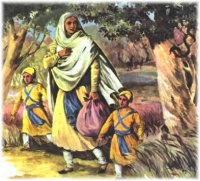Template:AOW56: Difference between revisions
Hari singh (talk | contribs) No edit summary |
Hari singh (talk | contribs) mNo edit summary |
||
| Line 3: | Line 3: | ||
[[Image:Sahib2.jpg|thumb|200px|right|<small>Mata Gujari with the younger Sahibzade</small>]] | [[Image:Sahib2.jpg|thumb|200px|right|<small>Mata Gujari with the younger Sahibzade</small>]] | ||
[[Sahibzada Zorawar Singh]] (1696-1705):- On 28 November every year, the | [[Sahibzada Zorawar Singh]] (1696-1705):- On '''28 November''' every year, the [[Sikh]]s celebrate the birthday of the third son of [[Guru Gobind Singh]], [[Sahibzada Zorawar Singh]]. He was born to [[Mata Jito]] ji (also known as Mata Sundari ji) at [[Anandpur]] on 28 November 1696 and was barely nine years old at the time of the evacuation of [[Anandpur]] on the night of 5-6 December 1705. Since the death of his mother, Mata Jito, on 5 December 1700, his grandmother [[Mata Gujari]] who had been especially attached to young Zorawar Singh and his infant brother, [[Fateh Singh]] took charge of both of them as the column moved out of [[Anandpur]]. | ||
While crossing on horseback the rivulet [[Sirsa]], then in flood, the three were separated from [[Guru Gobind Singh]] and the main party of Sikhs. Their cook, Gangu, who had also succeeded in crossing the stream, escorted them to his own house in the village of '''Kheri''', now known as '''''Saheri''''', near [[Morinda]] in present-day [[Ropar]] district. While unsaddling the horse he saw that there was some cash in the saddlebag. This tempted him to treachery. He not only stole the saddlebag during the night, but also planned to betray the fugitives to the government in hope of a reward. {{aowf|Sahibzada Zorawar Singh}} | While crossing on horseback the rivulet [[Sirsa]], then in flood, the three were separated from [[Guru Gobind Singh]] and the main party of Sikhs. Their cook, Gangu, who had also succeeded in crossing the stream, escorted them to his own house in the village of '''Kheri''', now known as '''''Saheri''''', near [[Morinda]] in present-day [[Ropar]] district. While unsaddling the horse he saw that there was some cash in the saddlebag. This tempted him to treachery. He not only stole the saddlebag during the night, but also planned to betray the fugitives to the government in hope of a reward. {{aowf|Sahibzada Zorawar Singh}} | ||
Revision as of 20:52, 26 November 2007
Sahibzada Zorawar Singh (1696-1705):- On 28 November every year, the Sikhs celebrate the birthday of the third son of Guru Gobind Singh, Sahibzada Zorawar Singh. He was born to Mata Jito ji (also known as Mata Sundari ji) at Anandpur on 28 November 1696 and was barely nine years old at the time of the evacuation of Anandpur on the night of 5-6 December 1705. Since the death of his mother, Mata Jito, on 5 December 1700, his grandmother Mata Gujari who had been especially attached to young Zorawar Singh and his infant brother, Fateh Singh took charge of both of them as the column moved out of Anandpur.
While crossing on horseback the rivulet Sirsa, then in flood, the three were separated from Guru Gobind Singh and the main party of Sikhs. Their cook, Gangu, who had also succeeded in crossing the stream, escorted them to his own house in the village of Kheri, now known as Saheri, near Morinda in present-day Ropar district. While unsaddling the horse he saw that there was some cash in the saddlebag. This tempted him to treachery. He not only stole the saddlebag during the night, but also planned to betray the fugitives to the government in hope of a reward. .....More

